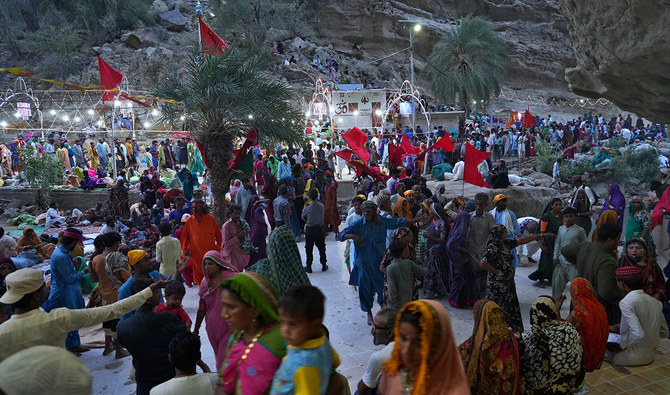HINGLAJ, Pakistan: The ascent of steep mud volcanoes marks the start of Hindu pilgrims’ religious rituals in southwestern Pakistan.
They climb hundreds of stairs or clamber over rocks to reach the summit, tossing coconuts and rose petals into the shallow crater while seeking divine permission to visit Hinglaj Mata, an ancient cave temple that is the focus of their three-day worship.
The dramatic surroundings of Hingol National Park in Baluchistan province are the setting for Pakistan’s largest Hindu festival, Hinglaj Yatra, which started on Friday and ends on Sunday. Organizers say more than 100,000 Hindus are expected to participate.
Muslim-majority Pakistan is home to 4.4 million Hindus, just 2.14 percent of the population, and Hinglaj Mata is one of the few Hindu sites that continues to draw large numbers of pilgrims every year from across the country.
Muslims and Hindus generally live peacefully in Pakistan, from where most of the Hindus migrated to India when it was divided by British colonialists in 1947. But there have been attacks on Hindu temples in recent years as relations between the rivals remain tense.

Hindu devotees walk toward a mud volcano to start Hindu pilgrims' religious rituals for an annual festival in an ancient cave temple of Hinglaj Mata in Hinglaj in Lasbela district in the Pakistan's southwestern Baluchistan province, Friday, April 26, 2024. (AP)
Hindus believe Hinglaj Mata is one the places where the remains of Sati, the goddess of marital felicity and longevity, fell to earth after she ended her life.
Maharaj Gopal, the temple’s most senior cleric, explains why people flock to it.
“It is the most sacred pilgrimage in the Hindu religion,” said Gopal. “Whoever visits the temple and worships accordingly during these three days will have all of their sins forgiven.”
The journeys begin hundreds of kilometers (miles) away, mostly from neighboring Sindh province. Hundreds of packed buses set off from cities like Hyderabad and Karachi, traveling along the Makran Coastal Highway that hugs Pakistan’s south and southwest.

Hindu devotees attend an annual festival in an ancient cave temple of Hinglaj Mata in Hinglaj in Lasbela district in the Pakistan's southwestern Baluchistan province, Friday, April 26, 2024. (AP)
But there’s scant parking and vehicular access to the holy sites, so many pilgrims disembark and complete their travel by walking over parched and rocky terrain, sometimes barefoot and carrying children or luggage.
It’s a few kilometers (miles) from the main road to the mud volcano and then, from there, almost 45 kilometers (25 miles) to Hinglaj Mata.
Winds buffet the desert-like conditions, churning up dust that whips the eyes, nose and mouth. The pilgrims’ festive cheer and brightly colored apparel are a contrast to the arid landscape. Strong gusts distort people’s celebratory cries of “Jai mata di” and “Jai shiv shankar.”
Kanwal Kumar, 28, was visiting the temple for the first time with her husband. “We have yet to conceive a child after six years of marriage, so we are hopeful for help from the goddess,” she said. “We believe that no one returns empty-handed. All wishes are granted by Hinglaj Mata.”
The Hindu festival brings the Pakistani park to life. Hundreds of stalls spring up to sell snacks, drinks, jewelry, and clothing. Vats of hot food are prepared in the open air or thatched huts. Pilgrims purchase coconuts, sweetmeats, flowers, and incense for their ritualistic offerings.
Aloo Kumar, 55, wanted to express her gratitude to Lord Shiva, one of Hinduism’s three most important deities. “He blessed our family with a grandson,” Kumar said, gesturing toward the boy beside her cradling his baby sibling. “We prayed for a grandson during last year’s festival.”

Hindu devotees perform their rituals during an annual festival in an ancient cave temple of Hinglaj Mata in Hinglaj in Lasbela district in Pakistan's southwestern Baluchistan province, Friday, April 26, 2024. (AP)
Hinglaj Mata thrums with activity, even after dark. Fairy lights and other decorations adorn the shrine and pilgrims jostle for position in front of it, sometimes holding up babies so the deities can bless them. Stewards urge them to pay their respects and move along.
The park’s Hingol River provides Hindu pilgrims with the opportunity for ritual bathing, like the Ganges in India.
While there is no ban on Hindu worship in Pakistan, openly practicing the faith is not routine as ties between India and Pakistan are broken. Their interactions are riddled with animosity and suspicion after having fought three wars, built up their armies and armed them with nuclear weapons.
Travel restrictions and hostile bureaucracies largely keep people from crossing the border for leisure, study and work, although the countries sometimes make exceptions for religious pilgrimages, usually for India’s Sikhs.
The decades of political hostility present a challenge for the minority Hindu community, as many in Pakistan equate Hindus with India. The reverse exists in India, where Muslims complain of discrimination.
Versimal Divani, the general secretary of Hinglaj Mata, lamented that only Hindus in Pakistan can attend the festival.
“We can visit this temple in our beloved country whenever our heart desires,” said Divani. “But this is not the case for the rest of the world’s Hindus. I would like the Pakistani government to issue them visas so they can come here and take blessings with them. It’s good for people-to-people contact and it’s good for the economy too.”












